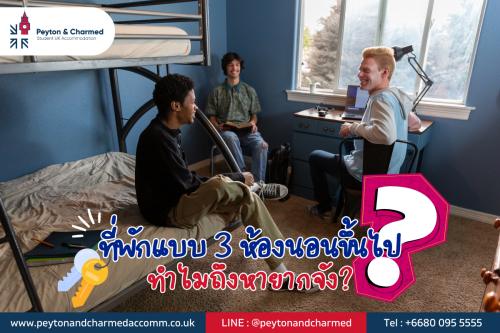When renting student accommodation in the UK, whether it's private student accommodation or a student hall, students cannot allow another person or representative to collect the accommodation key on their behalf. Besides being against the regulations, the worst-case scenario could lead to someone else trespassing and living in the accommodation you've signed a lease for, refusing to move out, resulting in legal issues or what's known as ‘Squatting,’ which is currently a problem in the UK.
Collecting the Accommodation Key in the UK (Collect The Key)
After securing your preferred student accommodation and signing the lease agreement, a very important step that students should not overlook is collecting the accommodation key. This is usually scheduled for the move-in day. The accommodation provider will ask students to complete a Pre-Check In on their website to fill in personal details, the move-in date and time, and the location for key collection (each accommodation will have different time slots and key collection locations). Once the details are filled in, many accommodations will ask students to print out the completed information to present as confirmation on the key collection day. If students do not have this proof, the accommodation might not be able to hand over the key.
Furthermore, when collecting the accommodation key, students must present their Passport, Visa, or ID card to verify their identity for receiving the student accommodation key.
Why Someone Else Can't Collect the Accommodation Key on Your Behalf
Collecting accommodation keys in the UK has mandatory regulations stating clearly that you cannot allow another person, or even a housing agency, to collect the key on your behalf. As mentioned above, collecting the key requires presenting identification. Therefore, if the person collecting the key is different from the tenant and doesn't have proof of identity, students could be at risk from fraudulent student housing agencies and Squatting, or someone could impersonate them to move into their accommodation.
What is ‘Squatting’?
Squatting is when someone intentionally moves into and lives in someone else's property without the owner's permission. The person who intends to move into someone else's property is called a ‘Squatter’ or ‘Trespasser’ – someone who unlawfully occupies the buildings or houses of others.
In the UK, moving into someone else's property, such as a house or flat, without the owner's permission is illegal. The penalties range from a fine of up to £5,000, imprisonment for up to 6 months, or both.
However, if someone moves in with the permission of the property owner (landlord), they are not considered a squatter. For example, if Thai students rent a private apartment and agree to a lease by paying rent, this is not considered squatting.
Another reason why you shouldn't let someone else collect your student accommodation key is the risk of being scammed by fraudulent housing agencies. Agencies that claim they can collect the key on your behalf might not actually collect it and might not have any accommodation to rent. According to the principles, once the lease agreement is completed, students must complete the Pre-Check In on the accommodation's website themselves to inform them of the move-in date and collect the key, which is usually handed over on the move-in day. The accommodation provider will clearly state that no one else can collect the key on your behalf under any circumstances.
Therefore, any agency that says they can collect the key for you is violating the accommodation rental regulations in the UK and is not helping students protect their interests. Importantly, avoiding meeting in person and making various seemingly good excuses are warning signs that you might be dealing with an illegal housing agency in the UK.
Other Risks That May Occur If You Don't Collect the Accommodation Key Yourself
- Being Scammed by Fraudsters: You might not get any accommodation at all, losing both money and time because the scammer claims they will collect the key for you but then becomes unreachable, disappearing with your accommodation deposit.
- Getting Accommodation That Doesn't Match the Description: Usually, key collection is scheduled at the student accommodation with the accommodation representative directly, giving students confidence that they will get the accommodation they actually want. However, if you don't collect the key yourself, you might be tricked by an agency into getting a different room than the one you agreed to rent, or the accommodation might not match the description.
Reading this far, many of you might not have realized that not collecting your student accommodation key yourself could cause such significant damage to your study abroad experience. This problem is currently happening and has happened before in the UK. If you don't want to encounter such situations, you need to know the regulations for collecting student accommodation keys in the UK to protect your rights.
The next question is: Besides ourselves, who else is allowed to have the room key?
The Accommodation Owner or Representative Can Have a Key
The answer is yes, they can. The accommodation owner or their representative has the right to have a key to the property they are renting out. This is because the owner or representative has the right to enter your room in certain circumstances, such as emergencies where you need urgent help, a burst pipe, an electrical fault, or a gas leak. However, the owner or representative cannot enter your room at their convenience and must give you at least 24 hours' written notice beforehand; otherwise, it will be considered a criminal offense under the Tenancy Agreement.
In Which Cases Can the Accommodation Owner Enter Your Room?
- To Carry Out Repairs or Maintenance: The reason why the accommodation owner or representative often keeps a key is for access to carry out repairs and maintenance. If you suspect a faulty appliance, the owner can enter to fix it even if you are not there.
- Emergencies: Such as a gas leak or a burst pipe, these are emergency situations where the owner or representative needs to address the problem immediately to prevent potential damage to the property and the tenants themselves. Similarly, if an emergency occurs and the owner doesn't have a key, having to wait for the tenant could lead to significant damage.
- Annual Inspections: For the safety of tenants, the UK has gas and electrical safety inspections. These inspections are usually carried out annually, and the accommodation owner needs a key to facilitate access for inspection even if the tenant is not in the room.
- Lost Keys or Keys Locked Inside: In this case, it is necessary for the accommodation owner or representative to have a key to resolve the problem quickly.
- Showing the Room to Prospective Tenants: When the lease agreement is nearing its end, the accommodation owner or representative often needs to find new tenants in advance. Therefore, in this case, the owner or representative may need to show potential tenants the condition of the room, requiring them to have a key.
How about these very useful regulations for collecting student accommodation keys in the UK? Besides helping to screen out fraudulent housing agencies in the UK, they also help reduce the risk of squatters. For students who need advice on student accommodation, don't forget to contact Peyton & Charmed to help us check or find accommodation for you with peace of mind, ‘Because We Believe In Care And Trust.’
Contact for more information LINE: @peytonandcharmed or click👉🏻https://lin.ee/BswYkfQ 📞+ 6680 095 5555 www.peytonandcharmedaccomm.co.uk
Source of Information
- Squatting and the law https://bit.ly/3F3zUGs
- What to check for in your tenancy agreement https://bit.ly/3PKyyVI
- Access to your rented home for repairs and inspectionshttps://bit.ly/3PKmUKM
- Can a Landlord Keep a Set of Keys? https://bit.ly/3Q3CRNB
- Moving in https://www.iqstudentaccommodation.com/moving-in







